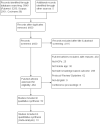Mobile applications in medical education: A systematic review and meta-analysis
- PMID: 35324994
- PMCID: PMC8947018
- DOI: 10.1371/journal.pone.0265927
Mobile applications in medical education: A systematic review and meta-analysis
Abstract
Objective: This review evaluates the effectiveness of smartphone applications in improving academic performance and clinical practice among healthcare professionals and students.
Methods: This study followed the Preferred Reporting Items for Systematic Reviews and Meta-Analyses (PRISMA) guidelines. Articles were retrieved from PubMed, Scopus, and Cochrane library through a comprehensive search strategy. Studies that included medical, dental, nursing, allied healthcare professional, undergraduates, postgraduates, and interns from the same disciplines who used mobile applications for their academic learning and/or daily clinical practice were considered.
Results: 52 studies with a total of 4057 learner participants were included in this review. 33 studies (15 RCTs, 1 cluster RCT, 7 quasi-experimental studies, 9 interventional cohort studies and 1 cross-sectional study) reported that mobile applications were an effective tool that contributed to a significant improvement in the knowledge level of the participants. The pooled effect of 15 studies with 962 participants showed that the knowledge score improved significantly in the group using mobile applications when compared to the group who did not use mobile applications (SMD = 0.94, 95% CI = 0.57 to1.31, P<0.00001). 19 studies (11 RCTs, 3 quasi-experimental studies and 5 interventional cohort studies) reported that mobile applications were effective in significantly improving skills among the participants.
Conclusion: Mobile applications are effective tools in enhancing knowledge and skills. They can be considered as effective adjunct tools in medical education by considering their low expense, high versatility, reduced dependency on regional or site boundaries, online and offline, simulation, and flexible learning features of mobile apps.
Conflict of interest statement
The authors have declared that no competing interests exist.
Figures
References
-
- Snashall E, Hindocha S. The Use of Smartphone Applications in Medical Education. Open Medicine Journal [Internet]. 2016. Dec 27 [cited 2021 Jan 22];3(1). Available from: https://benthamopen.com/FULLTEXT/MEDJ-3-322
-
- Wayne DB, Green M, Neilson EG. Medical education in the time of COVID-19. Sci Adv [Internet]. 2020. Jul 29 [cited 2021 Jan 22];6(31). Available from: https://www.ncbi.nlm.nih.gov/pmc/articles/PMC7399480/ doi: 10.1126/sciadv.abc7110 - DOI - PMC - PubMed
-
- Medical Student Education in the Time of COVID-19 | Medical Education and Training | JAMA | JAMA Network [Internet]. [cited 2021 Jan 22]. Available from: https://jamanetwork.com/journals/jama/fullarticle/2764138
-
- Medical education during COVID-19: Lessons from a pandemic | British Columbia Medical Journal [Internet]. [cited 2021 Feb 9]. Available from: https://bcmj.org/special-feature-covid-19/medical-education-during-covid...
Publication types
MeSH terms
LinkOut - more resources
Full Text Sources





